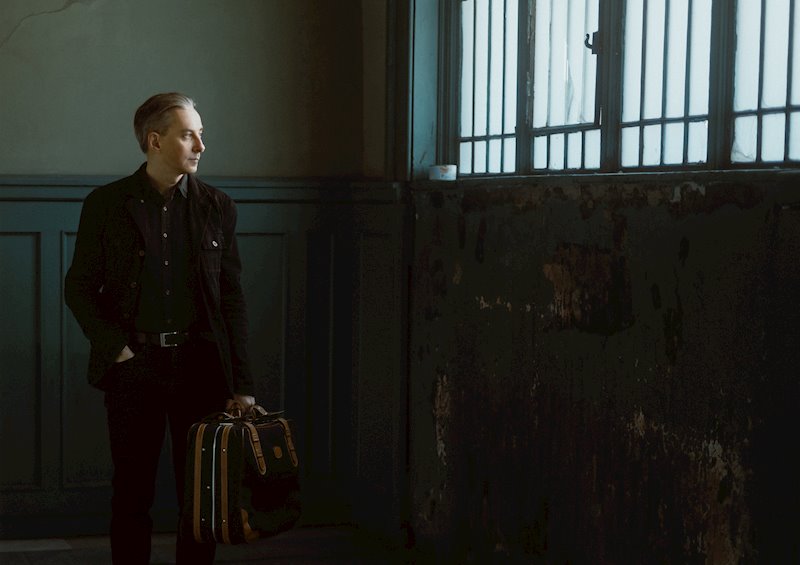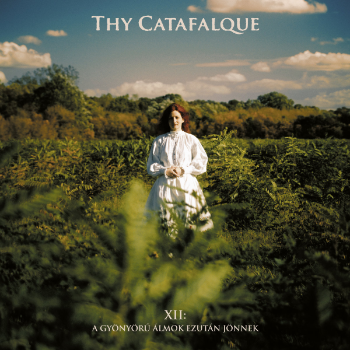A catafalque is a platform on which the coffin of a high-ranking person is traditionally displayed. A kind of final way to emphasize the superiority of the person in question. In the case of Thy Catafalque, one can only guess at the connection (if any) with this pedestal for the dead. What we can certainly say is that a certain eminence can be attributed to the Hungarian one-man formation (with an incredible number of auxiliary troops) too. Not through pretension or self-aggrandizement. No, this music elevates itself above everything else. Above guitar music. But above all, above musical limitation or framing. Maybe even beyond death. This is music for eternity. According to a certain digital translation agency, the album title A gyönyörű álmok ezután jönnek can be loosely explained as: “The most beautiful dreams are yet to come”. That can hardly be a coincidence. Let the great joy begin. The good man is already waiting for us with his suitcase to take us on a trip.

Before we can enjoy it, it is necessary to deal with the figures. A mathematician would spontaneously have an orgasm from it. First of all, it is not without reason that the Roman notation of the number twelve precedes the title of the album. This is the – drumroll please – twelfth album by multi-instrumentalist and mastermind Tamás Katai. Since its founding in 1998, an album has been released on average just less than once every two years. As a common thread in Thy Catafalque‘s discography, there always are the necessary auxiliary forces. This time we find no less than twenty-seven (!!) guest artists who contribute to the album. In many cases they bring a vocal contribution (including those by well-known Martina Veronika Horváth and Gábor Dudás), but various instrumental additions are also made. In addition to ordinary guitars, we also find oud, bouzouki, baglamas, violin, electric cello, French horn, clarinet, trumpet, flugelhorn, trombone and saxophone. As if that wasn’t enough, all these fantastic instruments and vocal cords were also recorded in twelve different countries on four different continents.
All this splendor starts with Piros Kocsi, Fekete Éj. In contrast to the opener on predecessor Alföld (gosh, what a hit A csend hegyei is) we get a folky, guitar-driven earworm. The song’s strength lies in the leading melody, which emerges from both the vocal and guitar lines. The serene vocals of Martina Veronika Horváth and warm vocals of veteran Attila Bakos give the whole thing a nostalgic feeling. Halfway through we get a bunch of nice riffs. When Horváth’s vocals return with the melody, the circle is complete. With Mindenevo we briefly remain in folklore with Edu Giró’s bouzouki. However, this time, it doesn’t take long before the song turns to a rough blackened passage full of heavy riffs. However, this is not the only detour taken. We find ourselves successively in occult doom atmospheres, 90s Norwegian melodic black and lounge music supported by strings. Too crazy for words? Normally yes, but there is one man who can make this happen.
The quiet finish of the previous song turns out to be a prelude to a more peaceful middle section with many folk influences. Nyárfa, Nyírfa is carried by the endearing vocals of Gábor Dudás. On Lydiához the singer is accompanied by the bouzouki and by singer Martina Veronika Horváth. A subdued song, where the beauty can be found in the simple melody, but above all the harmony singing by the two vocalists. The summer atmosphere of the bouzouki is further continued in the swinging, brass-supported Vakond. Let’s put our dancing shoes on one more time.
Boys and girls, Tamás Kátai does it again! This number XII has once again become a very colorful collection of high-quality music. The avant-garde character is certainly present again, although the extremes are less explored than, for example, on predecessors Vadak or Naiv. On the other hand, the songs have a more focused approach and there is more attention for catchy melodies. This in a way contributes to the hit-potential of some contributions, which certainly encourage a Hungarian festival. However, the darkness is well represented by heavy passages and other heavy violence. Thy Catafalque once again takes the listener on a journey along unexpected places.

Score:
86/100
Label:
Season of Mist, 2024
Tracklisting:
- Piros Kocsi, Fekete Éj
- Mindenevö
- Vasgyár
- Világnak Világa
- Nyárfa, Nyírfa
- Lydiához
- Vakond
- Ködkiraly
- Aláhullás
- A gyönyörü álmok ezután jönnek
- Babylon
Line-up:
- Tamás Kátai – Guitar, bass guitar, vocals, keyboards, programming
Links:










